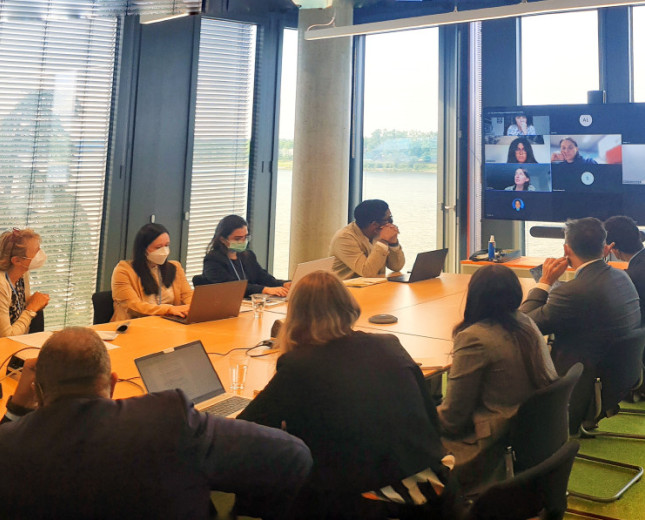A first exploratory dialogue between private sector finance and climate finance policymakers took place on the sidelines of the SB56 in a hybrid format in the new Climate Tower overlooking the Rhine in Bonn on 09 June 2022.
The urgency of climate change means that the engagement and financial involvement of national and international private sector finance stakeholders is critical especially to those countries most vulnerable. On the one hand, private sector finance can deliver the investment needed for developing countries to accelerate the implementation of their national climate priorities as set out in their NDCs and NAPs etc. On the other hand, climate finance policymakers provide policies that enable vast stocks of private capital to flow for climate action.
The dialogue which was welcomed by all participants provided first impressions of what future dialogues between the multilateral climate finance process and private sector finance could look like. The dialogue was attended by predominantly developing country climate finance negotiators (AILAC, AOSIS, ABU etc.) who exchanged views and priorities with members of private sector finance firms, alliances, and academia (Citi Global Group, S&P Ratings, Aviva, CDP/Investor Agenda, Egyptian FinTech Association, Cambridge Institute for Sustainability Leadership, Glasgow Finance Alliance for Net Zero, UN-PRI etc.). The event organized by the climate finance subdivision, in collaboration with communication engagement sub-division, was opened by Mr. Daniele Violetti (Senior Director UNFCCC) and moderated by Mr. Zaheer Fakir (South Africa).
Mr. Mahmoud Mohieldin, the High-Level Climate Champion (Egypt), outlined that while sources of private sector finance are vast and varied, corporate and SME private sector itself also needs climate finance in all countries. Participants outlined areas which could be further discussed in future dialogues such as the importance of setting targets and goals, NDCs, investment plans, systemic change in the financial system, instruments/risk, scaling up blended finance, green supply chains and pipelines, definitions, availability of data and standards harmonization.
The co-chairs of the ad hoc work programme on the new collective quantified goal (NCQG) found the dialogue helpful in informing and identifying areas of incremental engagement with the NCQG ad hoc work programme, including which types of private sector finance stakeholders and groups could be involved and at which stage in the work programme.
